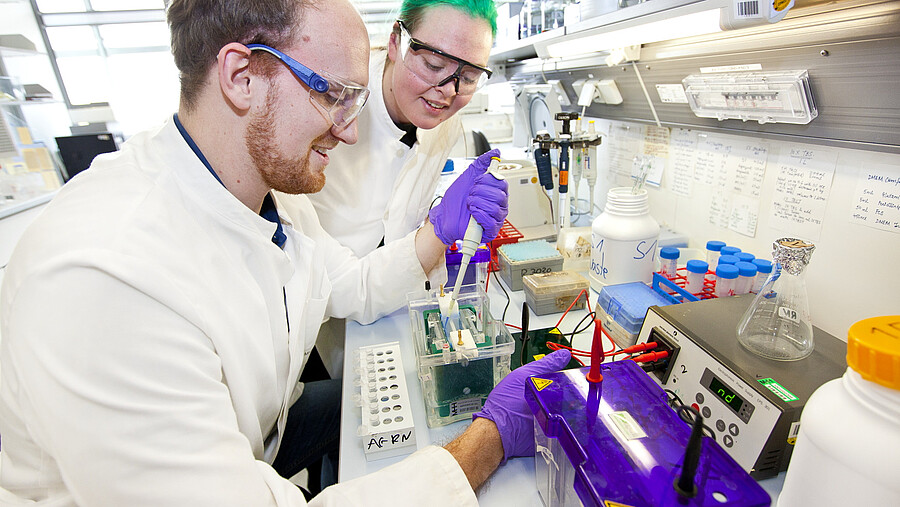Biochemistry
(Master of Science)
Profile
German HZB: none
International application: German C1
Find out more
Stay abroad possible, but not obligatory.
Short Description
Biochemistry is concerned with life processes at the molecular level. It is an independent subject area that overlaps with related specialist fields in numerous ways. The degree programme is offered in cooperation with the Hannover Medical School.
The Master’s degree programme in Biochemistry focuses on scientifically oriented professional activity. In particular, students gain interdisciplinary specialist knowledge in the area of overlap between biochemistry, biology, chemistry and medicine. They are also taught how to achieve and process scientific results, and to communicate these results in an appropriate manner – also in English. Students gain the skills required to go on to pursue a doctorate, if desired.
The Master’s degree programme is in keeping with the strengths of Hannover Medical School, which is why the lines of research of the Centre for Biochemistry’s institutes have been selected as the core of the programme. As a result, graduates have a sound knowledge of subjects such as Signal Transduction, Biophysical Chemistry, Chemical Glycobiology and Pathobiochemistry. These courses are supplemented by an extensive compulsory elective area, enabling students to specialise in medically related subjects (Pharmacology/Toxicology, Immunology, Microbiology …) or in Organic Chemistry or Biotechnology.
As such, the degree programme is designed so as to provide graduates with excellent skills required in numerous careers in the area of biochemical research at university and in industry.
Further information on the website of the programme Biochemistry
Course Content
- Biochemistry
- Biophysical chemistry
- Compulsory elective area
- Chemical glycobiology
- Freely selectable optional area
- Pathobiochemistry
- Signal transduction
The programme focuses on the exploration of the cellular and molecular basis of life processes and their pathological changes. Following the decoding of the genomes of all kinds of organisms, current biochemistry focuses on the investigation of signal transduction, the characterisation of transcriptomes, proteomes and glycomes, and on systems biology approaches. In addition to these areas taught in the compulsory area of the Master’s degree programme, a compulsory elective area offers biochemical and life science modules as well as modules related to medicine and the chemistry of natural products. Students also have the option of completing practical training abroad or in industry. Courses outside the discipline and other modules from the compulsory elective area can be integrated in a freely selectable optional area. In this way, students are given the opportunity to broaden their education, to focus more strongly on their interests, and to gain key transferable skills for the labour market.
In order to expand on their specialist knowledge and skills, graduates may also pursue a traditional doctorate or participate in PhD degree programmes and research training groups.
| 1. - 3. Semester | Pflichtmodule 36 LP | Wahlpflichtmodule 36 LP | Wahlmodule 18 LP |
|---|---|---|---|
| 4. Semester | Masterarbeit 30 LP | ||
A profound understanding of biochemistry, a good knowledge of physical chemistry, experimental skills and the ability to work in a team are the requirements for the successful completion of this degree programme.
In the Master’s degree programme, it is assumed that students have a basic knowledge of the English language from the very first semester. Some of the compulsory modules are delivered in English. In addition, optional and compulsory elective courses are offered in English.
Graduates perform work at higher education institutions and research institutions, in the chemical and pharmaceutical industries, related industries and in the public sector (research, chemical analysis, R&D, production and administration). They also engage in freelance work, e.g. as science journalists or patent lawyers.
The Master’s degree qualifies graduates to pursue a doctorate.
Admission Requirements
An undergraduate degree in a related field of study, such as
For master's degree programmes with restricted admission, places shall be allocated according to the university’s own selection procedure, if there are more applicants fulfilling the admission requirements than there are places available. The exact admission requirements and the link to the application can be found on the website of the Medizinische Hochschule Hannover.
Application Deadlines
First-year students
- 1 May – 15 July of the year for the winter semester
- 1 December – 15 January of the year for the summer semester
Students resuming their studies and transfer students (application in a higher semester)
- 1 May – 15 July of the year for the winter semester
- 1 December – 15 January of the year for the summer semester
Do you have questions about studying? We are happy to help!

30167 Hannover

30167 Hannover









